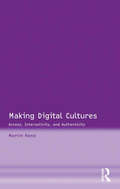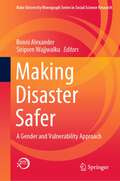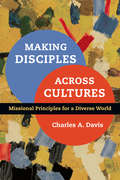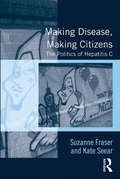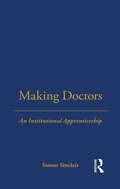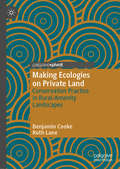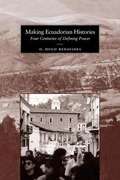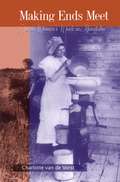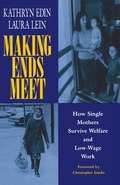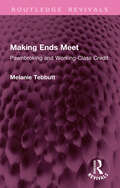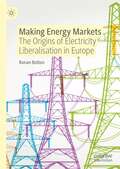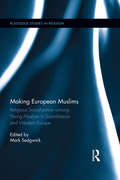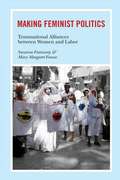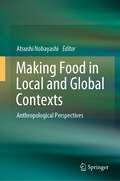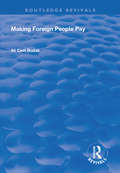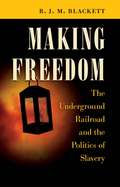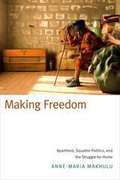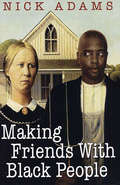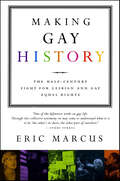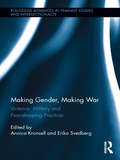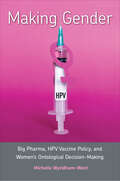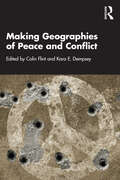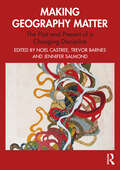- Table View
- List View
Making Digital Cultures: Access, Interactivity, and Authenticity
by Martin HandMany people in the West or global North now live in a culture of 24/7 instant messaging, iPods and MP3s, streamed content, blogs, ubiquitous digital images and Facebook. But they are also surrounded by even more paper, books, telephone calls and material objects of one kind or another. The juxtaposition and proliferation of older and newer technologies is striking. Making Digital Cultures brings together recent theorizing of the 'digital age' with empirical studies of how institutions embrace these technologies in relation to older established technological objects, processes and practices. It asks how relations between 'analogue' and 'digital' are conceptualized and configured both in theory and inside the public library, the business organization and the archive. With its direct engagement with new media theory, science and technology studies, and cultural sociology, this volume will be of interest to scholars and students in the areas of media and communication and science and technology studies.
Making Disaster Safer: A Gender and Vulnerability Approach (Kobe University Monograph Series in Social Science Research)
by Siriporn Wajjwalku Ronni AlexanderThis edited book was produced through a transnational and transdisciplinary UNESCO Chair Project on Gender and Vulnerability in Disaster Risk Reduction Support. Contributors come from five disaster-prone Asian countries, and the chapters reflect their rich knowledge and practical experience in disaster management and humanitarian assistance. The chapters, all with a focus on gender and vulnerability, illustrate that gender can make people, especially women, vulnerable. The chapters address the experiences of state and non-state actors responding to disaster and promoting recovery at the local level. However, while women and vulnerable people may be victims of disasters, they also serve as agents for recovery and voices for better disaster preparedness. In sharing both successes and failures, as well as suggestions for the future, this book speaks to the need for transdisciplinary knowledge and multilevel coordination, as well as full equality for all genders and respect for human rights, in order to cope with increasingly more frequent, intense, and complex emergencies. This book is of interest as a text to students in a variety of disciplines who are focusing on disaster and health emergencies, as well as to practitioners and others promoting disaster risk reduction and resilience.
Making Disciples Across Cultures: Missional Principles for a Diverse World
by Charles A. DavisCulture affects how we make disciples. We often unconsciously bring our own cultural assumptions into ministry and mission, not realizing that how we think and operate is not necessarily the best or only way to do things. In today's global environment, disciplemaking requires the cultural humility and flexibility to adapt between different cultural approaches. Charles Davis, former director of TEAM, provides a framework for missional disciplemaking across diverse cultural contexts. He shows how we can recalibrate our ministry efforts, like adjusting sound levels on a mixer board, to accommodate different cultural assumptions. With on-the-ground stories from a lifetime of mission experience, Davis navigates such tensions as knowledge and behavior, individualism and collectivism, and truth and works to help Christian workers minister more effectively. Ministry teams, church planters, pastors and missionaries working interculturally at home or overseas can be part of God's movement of making disciples. Discover how the body of Christ grows in the unity and diversity of the global church.
Making Disease, Making Citizens: The Politics of Hepatitis C
by Suzanne Fraser Kate SeearSince the naming of hepatitis C in 1989, knowledge about the disease has grown exponentially. So too, however, has the stigma with which it is linked. Associated with injecting drug use and tainted blood scandals, hepatitis C inspires fear and blame. Making Disease, Making Citizens takes a timely look at the disease, those directly affected by it and its social and cultural implications. Drawing on personal interviews and a range of textual sources, the book presents a scholarly and engaging analysis of a newly identified and highly controversial disease and its relationship to philosophies of health, risk and harm in the West. It maps the social and medical negotiations taking place around the disease, shedding light on the ways these negotiations are also co-producing new selves. Adopting a feminist science and technology studies approach, this theoretically sophisticated, empirically informed analysis of the social construction of disease and the philosophy of health will appeal to those with interests in the sociology of health and medicine, health communication and harm reduction, and science and technology studies.
Making Doctors: An Institutional Apprenticeship (Explorations in Anthropology)
by Simon SinclairFew outsiders realize that student illness is frequently, and ironically, a by-product of medical training. This unique study by a medical doctor and trained anthropologist debunks popular myths of expertise and authority which surround the medical establishment and asks provoking questions about the acquisition and dissemination of knowledge within the field. In detailing all levels of basic training in a London medical school, the author describes students' 'official' activities (that is, what they need to do to qualify) as well as their 'unofficial' ones (such as their social life in the bar). This insider's exposé should prompt a serious reconsideration of abuses in a profession which has a critical influence over untold lives. In particular, it suggests that the structures and discourses of power need to be re-examined in order to provide satisfactory answers to sensitive questions relating to gender and race, the dialogue between doctor and patient and the mental stability of students under severe stress.
Making Ecologies on Private Land: Conservation Practice in Rural-Amenity Landscapes
by Ruth Lane Benjamin CookeThis book explores conservation practices on private land, based on research conducted with landholders in the hinterlands of Melbourne, Australia. It examines how conservation is pursued as an intimate interaction between people and ecologies, suggesting that local ecologies are lively participants in this process, rather than simply the object of conservation, and that landholders develop their ideas of environmental stewardship through this interaction. The book also explores the consequences of private property as a form of spatial organisation for conservation practice; the role of formative interactions with ecologies in producing durable experiential knowledge; how the possibilities for contemporary conservation practice are shaped by historical landscape modification; and how landholders engage with conservation covenants and payment schemes as part of their conservation practice. The authors conclude with ideas on how goals and approaches to private land conservation might be reframed amid calls for just social and ecological outcomes in an era of rapid environmental change.
Making Ecuadorian Histories: Four Centuries of Defining Power
by O. Hugo BenavidesIn Ecuador, as in all countries, archaeology and history play fundamental roles in defining national identity. Connecting with the prehistoric and historic pasts gives the modern state legitimacy and power.<P><P> But the state is not the only actor that lays claim to the country's archaeological patrimony, nor is its official history the only version of the story. Indigenous peoples are increasingly drawing on the past to claim their rights and standing in the modern Ecuadorian state, while the press tries to present a "neutral" version of history that will satisfy its various publics. <P> This pathfinding book investigates how archaeological knowledge is used for both maintaining and contesting nation-building and state-hegemony in Ecuador. Specifically, Hugo Benavides analyzes how the pre-Hispanic site of Cochasquí has become a source of competing narratives of Native American, Spanish, and Ecuadorian occupations, which serve the differing needs of the nation-state and different national populations at large. He also analyzes the Indian movement itself and the recent controversy over the final resting place for the traditional monolith of San Biritute. Offering a more nuanced view of the production of history than previous studies, Benavides demonstrates how both official and resistance narratives are constantly reproduced and embodied within the nation-state's dominant discourses.
Making Ends Meet: Farm Women's Work in Manitoba
by Charlotte van de VorstBased on hundreds of interviews with Manitoba farm men and women, Making Ends Meet reconstructs the common history shared by modern farm women as well as by their mothers and grandmothers. It explores women's changing roles on the farm, from the early days of the Red River settlement to the twentieth-century farm community. The women's own stories reveal their ingenuity and tenacity in "making ends meet" through economies, shared, labour, and generation of new resource income as varied as raising poultry and custom woodworking. These stories prove that the contributions of farm women have been vital in establishing and maintaining the family farm, and are critical to its continued survival.
Making Ends Meet: How Single Mothers Survive Welfare and Low-Wage Work
by Kathryn Edin Laura LeinWelfare mothers are popularly viewed as passively dependent on their checks and averse to work. Reformers across the political spectrum advocate moving these women off the welfare rolls and into the labor force as the solution to their problems. Making Ends Meet offers dramatic evidence toward a different conclusion: In the present labor market, unskilled single mothers who hold jobs are frequently worse off than those on welfare, and neither welfare nor low-wage employment alone will support a family at subsistence levels. Kathryn Edin and Laura Lein interviewed nearly four hundred welfare and low-income single mothers from cities in Massachusetts, Texas, Illinois, and South Carolina over a six year period. They learned the reality of these mothers' struggles to provide for their families: where their money comes from, what they spend it on, how they cope with their children's needs, and what hardships they suffer. Edin and Lein's careful budgetary analyses reveal that even a full range of welfare benefits—AFDC payments, food stamps, Medicaid, and housing subsidies—typically meet only three-fifths of a family's needs, and that funds for adequate food, clothing and other necessities are often lacking. Leaving welfare for work offers little hope for improvement, and in many cases threatens even greater hardship. Jobs for unskilled and semi-skilled women provide meager salaries, irregular or uncertain hours, frequent layoffs, and no promise of advancement. Mothers who work not only assume extra child care, medical, and transportation expenses but are also deprived of many of the housing and educational subsidies available to those on welfare. Regardless of whether they are on welfare or employed, virtually all these single mothers need to supplement their income with menial, off-the-books work and intermittent contributions from family, live-in boyfriends, their children's fathers, and local charities. In doing so, they pay a heavy price. Welfare mothers must work covertly to avoid losing benefits, while working mothers are forced to sacrifice even more time with their children. Making Ends Meet demonstrates compellingly why the choice between welfare and work is more complex and risky than is commonly recognized by politicians, the media, or the public. Almost all the welfare-reliant women interviewed by Edin and Lein made repeated efforts to leave welfare for work, only to be forced to return when they lost their jobs, a child became ill, or they could not cover their bills with their wages. Mothers who managed more stable employment usually benefited from a variety of mitigating circumstances such as having a relative willing to watch their children for free, regular child support payments, or very low housing, medical, or commuting costs. With first hand accounts and detailed financial data, Making Ends Meet tells the real story of the challenges, hardships, and survival strategies of America's poorest families. If this country's efforts to improve the self-sufficiency of female-headed families is to succeed, reformers will need to move beyond the myths of welfare dependency and deal with the hard realities of an unrewarding American labor market, the lack of affordable health insurance and child care for single mothers who work, and the true cost of subsistence living. Making Ends Meet is a realistic look at a world that so many would change and so few understand.
Making Ends Meet: Pawnbroking and Working-Class Credit (Routledge Revivals)
by Melanie TebbuttOriginally published in 1983, this book filled a gap in the existing literature, because the effect of credit upon a family’s real income was frequently omitted in studies of living standards. The book highlights daily routines and relationships which would otherwise remain hidden, using interviews with pawnbrokers, credit personnel and their customers in the Manchester and Salford areas of the UK. These supplement unusual documentary sources such as pledge records from the inter-war years which suggest how sensitive a barometer the trade was of working-class poverty or prosperity.The pawnshop epitomized the economic dependence of women, whose critical role in domestic management and credit organization is a key theme. Yet indebtedness became the fulfilment of a damning sexual stereotype. Insecurity of income and the physical conditions of life combined to produce a distinct set of values, of which pawning was a central part. At a time when the cost-of-living crisis is affecting the global population, and pawnbroking in the UK is on the increase, this book has an enduring relevance.
Making Energy Markets: The Origins of Electricity Liberalisation in Europe
by Ronan BoltonMaking Energy Markets charts the emergence and early evolution of electricity markets in western Europe, covering the decade from the late 1980s to the late 1990s. Liberalising electricity marked a radical deviation from the established paradigm of state-controlled electricity systems which had become established across Europe after the Second World War. By studying early liberalisation processes in Britain and the Nordic region, and analysing the role of the EEC, the book shows that the creation of electricity markets involved political decisions about the feasibility and desirability of introducing competition into electricity supply industries. Competition introduced risks, so in designing the process politicians needed to evaluate who the likely winners and losers might be and the degree to which competition would impact key national industries reliant on cross-subsidies from the electricity sector, in particular coal mining, nuclear power and energy intensive production. The book discusses how an understanding of the origins of electricity markets and their political character can inform contemporary debates about renewables and low carbon energy transitions.
Making European Muslims: Religious Socialization Among Young Muslims in Scandinavia and Western Europe (Routledge Studies in Religion)
by Mark SedgwickMaking European Muslims provides an in-depth examination of what it means to be a young Muslim in Europe today, where the assumptions, values and behavior of the family and those of the majority society do not always coincide. Focusing on the religious socialization of Muslim children at home, in semi-private Islamic spaces such as mosques and Quran schools, and in public schools, the original contributions to this volume focus largely on countries in northern Europe, with a special emphasis on the Nordic region, primarily Denmark. Case studies demonstrate the ways that family life, public education, and government policy intersect in the lives of young Muslims and inform their developing religious beliefs and practices. Mark Sedgwick’s introduction provides a framework for theorizing Muslimness in the European context, arguing that Muslim children must navigate different and sometimes contradictory expectations and demands on their way to negotiating a European Muslim identity.
Making Faces
by Adam S. WilkinsAdam Wilkins draws on studies of nonhuman species, the fossil record, genetics, and molecular and developmental biology to reconstruct the evolution of the human face and its inextricable link to our species’ evolving social complexity. The neural and muscular mechanisms that allowed facial expressions also led to speech, which is unique to humans.
Making Feminist Politics: Transnational Alliances between Women and Labor
by Suzanne Franzway Mary Margaret FonowIn this timely and detailed examination of the intersections of feminism, labor politics, and global studies, Suzanne Franzway and Mary Margaret Fonow reveal the ways in which women across the world are transforming labor unions in the contemporary era. Situating specific case studies within broad feminist topics, Franzway and Fonow concentrate on union feminists mobilizing at multiple sites, issues of wages and equity, child care campaigns, work-life balance, and queer organizing, demonstrating how unions around the world are broadening their focuses from contractual details to empowerment and family and feminist issues. By connecting the diversity of women's experiences around the world both inside and outside the home and highlighting the innovative ways women workers attain their common goals, Making Feminist Politics lays the groundwork for recognition of the total individual in the future of feminist politics within global union movements.
Making Food in Local and Global Contexts: Anthropological Perspectives
by Atsushi NobayashiThis book is a collection of research focusing on the anthropological aspects of how food is made in modern society from both global and local perspectives. Modern food consumed in any society is created in a variety of natural and cultural environments. There is a "food democracy" in which how we procure and share food can be an indicator of our participation in society, while food nurtured in particular climates and land can be transmitted to the outside world owing to the influence of tourism and the global economy, a phenomenon that is recognized on a global scale as exemplified by the UNESCO Intangible Cultural Heritage. In other words, food is an aspect of both culture and civilization. Anthropological approaches are used to reveal the humanistic aspects of food, highlighting the strength and individuality of regional and ethnic foods in global civilizations. The book is a compilation of results from sessions of the international symposium “Making Food in Human and Natural History”, which took place on March 18 and 19, 2019, in Osaka, Japan.
Making Foreign People Pay (Routledge Revivals)
by Ali Cem BudakFirst published in 1999, Making Foreign People Pay deals with the recovery of monetary claims in cross-border legal relations and contains the results of a comparative empirical research of debt recovery procedures of three countries with different socio-legal environments, Germany, England and Turkey. In order to analyse judicial debt recovery of cross-border claims, court statistics and files have been evaluated. The data show an infrequent use of the courts in all three countries. It seems that legal efforts aiming at facilitating international procedures have not been successful. But court procedures for the recovery of monetary claims are now to a large extent interchangeable with what may be called ‘privatised methods of debt collection’, including modern financial services such as factoring, forfaiting and commercial debt collection. Empirical evidence shows that such privatization of debt collection is a strong trend in cross-border debt collection. The book is an empirical contribution to the ongoing discussion of globalization processes and describes an important field of the globalization of law.
Making Freedom
by R. J. BlackettThe 1850 Fugitive Slave Law, which mandated action to aid in the recovery of runaway slaves and denied fugitives legal rights if they were apprehended, quickly became a focal point in the debate over the future of slavery and the nature of the union. In Making Freedom, R. J. M. Blackett uses the experiences of escaped slaves and those who aided them to explore the inner workings of the Underground Railroad and the enforcement of the Fugitive Slave Law, while shedding light on the political effects of slave escape in southern states, border states, and the North. Blackett highlights the lives of those who escaped, the impact of the fugitive slave cases, and the extent to which slaves planning to escape were aided by free blacks, fellow slaves, and outsiders who went south to entice them to escape. Using these stories of particular individuals, moments, and communities, Blackett shows how slave flight shaped national politics as the South witnessed slavery beginning to collapse and the North experienced a threat to its freedom.
Making Freedom: Apartheid, Squatter Politics, and the Struggle for Home
by Anne-Maria MakhuluIn Making Freedom Anne-Maria Makhulu explores practices of squatting and illegal settlement on the outskirts of Cape Town during and immediately following the end of apartheid. Apartheid's paradoxical policies of prohibiting migrant Africans who worked in Cape Town from living permanently within the city led some black families to seek safe haven on the city's perimeters. Beginning in the 1970s families set up makeshift tents and shacks and built whole communities, defying the state through what Makhulu calls a "politics of presence." In the simple act of building homes, squatters, who Makhulu characterizes as urban militants, actively engaged in a politics of "the right to the city" that became vital in the broader struggles for liberation. Despite apartheid's end in 1994, Cape Town's settlements have expanded, as new forms of dispossession associated with South African neoliberalism perpetuate relations of spatial exclusion, poverty, and racism. As Makhulu demonstrates, the efforts of black Capetonians to establish claims to a place in the city not only decisively reshaped Cape Town's geography but changed the course of history.
Making Friends With Black People
by Nick AdamsWhite people of America, we know you've got it rough. Sure, black men and women have been through four hundred years of slavery, oppression, murder, and watching white college students try to dance. But now that it's hip to have black friends, white people aren't sure how to go about it. And that is a real American tragedy. Thank God Nick Adams is here to help you avoid potential racial pitfalls and successfully make the transition from white to "aiight." Now, you'll know not to start a conversation with, "So, that new Jay-Z album is pretty great, right?" Or tell a co-worker he looks just like (fill in blank with name of dark-skinned person who works in the other building.) You'll know that a lot of black people you meet at parties or work functions don't care who played Thelma's husband on "Good Times", don't want to discuss the Malcolm X biography you just read and definitely don't want to listen to country music. Ever. Yes, it's a good thing Nick is here to explain. Because if we're going to live together in peace and harmony, you people are going to need help. Black People, Briefly Explained. A Q&A with Nick AdamsQ: Nick, what is the correct term to use when addressing my new friends: Black or African-American?A: Personally, I always liked Afro-American. I liked being named after a 1970's hairdo. But then I wondered why we didn't become the Jheri-curled Americans or High Top Fade Americans. Q: Nick, if black people can use the "N" word as a term of endearment, can I, a white person, do so? A: No. I don't care if you have your hair in cornrows while wearing a Phat Farm t-shirt at an R. Kelly concert. Black people don't get to be president, and white people don't get to use the word nigger. Can we just call it even now? Q: Nick, I'd like to try slang. Is that okay? A: When you guys start using our words, that's when we know it's time for us to stop using them. Every time a white, middle-aged math teacher calls a student, "dog," black people all over the country are notified via email. Believe it. Q: Nick, surely you have to agree that Eminem is a hip-hop visionary? A: Let's try this one more time: Kurtis Blow, RUN-DMC, LL Cool J, Rakim, Chuck D, KRS-One, Tupac, Notorious B.I.G., Nas, Common, Mos Def, Bitch!
Making Gay History: The Half-Century Fight for Lesbian and Gay Equal Rights
by Eric Marcus“Rich and often moving . . . at times shocking, but often enlightening and inspiring: oral history at its most potent and rewarding.” — Kirkus ReviewsA completely revised and updated edition of the classic volume of oral history interviews with high-profile leaders and little-known participants in the gay rights movement that cumulatively provides a powerful documentary look at the struggle for gay rights in America.From the Boy Scouts and the U.S. military to marriage and adoption, the gay civil rights movement has exploded on the national stage. Eric Marcus takes us back in time to the earliest days of that struggle in a newly revised and thoroughly updated edition of Making History, originally published in 1992. Using the heartfelt stories of more than sixty people, he carries us through a compelling five-decade battle that has changed the fabric of American society.The rich tapestry that emerges from Making Gay History includes the inspiring voices of teenagers and grandparents, journalists and housewives, from the little-known Dr. Evelyn Hooker and Morty Manford to former vice president Al Gore, Ellen DeGeneres, and Abigail Van Buren. Together, these many stories bear witness to a time of astonishing change, as queer people have struggled against prejudice and fought for equal rights under the law.
Making Gender, Making War: Violence, Military and Peacekeeping Practices (Routledge Advances in Feminist Studies and Intersectionality)
by Annica Kronsell Erika SvedbergMaking Gender, Making War is a unique interdisciplinary edited collection which explores the social construction of gender, war-making and peacekeeping. It highlights the institutions and processes involved in the making of gender in terms of both men and women, masculinity and femininity. The "war question for feminism" marks a thematic red thread throughout; it is a call to students and scholars of feminism to take seriously and engage with the task of analyzing war. Contributors analyze how war-making is intertwined with the making of gender in a diversity of empirical case studies, organized around four themes: gender, violence and militarism; how the making of gender is connected to a (re)making of the nation through military practices; UN SCR 1325 and gender mainstreaming in institutional practices; and gender subjectivities in the organization of violence, exploring the notion of violent women and non-violent men.
Making Gender: Big Pharma, HPV Vaccine Policy, and Women’s Ontological Decision-Making
by Michelle Wyndham-WestMaking Gender endeavours to understand how the HPV vaccine became gendered within the Canadian policy landscape – when the virus is gender blind and is linked to cancer in all genders – and how women’s experiences with this "gendered risk" have been folded into their vaccine decision-making. Drawing on ethnographic fieldwork and archival research, Michelle Wyndham-West explores the creation and circulation of gendered risk as it was deployed in pharmaceutical and policy discourses surrounding the roll-out of the HPV vaccine. The book contextualizes the background for how gendered risk was mediated by two groups of women: mothers negotiating the vaccine for their daughters in school-based immunization programs and university students who experienced frequent HPV infections. The book explores these women’s efforts to be good mothers and strong young women entering adulthood who felt vulnerable in sexual health negotiation. As a result, Making Gender reveals how vaccine decision-making took an ontological form, as an inherently social and cultural process embedded in women’s experiences.
Making Geographies of Peace and Conflict
by Colin Flint Kara E. DempseyThis book illustrates the diversity of current geographies, ontologies, engagements, and epistemologies of peace and conflict. It emphasizes how agencies of peace and conflict occur in geographic settings, and how those settings shape processes of peace and conflict. The essence of the book’s logic is that war and peace are manifestations of the intertwined construction of geographies and politics. Indeed, peace is never completely distinct from war. Each chapter in the book will demonstrate understandings of how the myriad spaces of war and peace are forged by multiple agencies, some possibly contradictory. The goals of these agents vary as peace and war are relational, place-specific processes. The reader will understand the mutual construction of spaces and processes of peace and conflict through engagement with the concepts of agency, the mutual construction of politics and space, geographic scales, multiple geographies, the twin dynamics of empathy/othering and inclusivity/partitioning, and resistance/militarism. The book discusses the intertwined nature of peace and conflict, including reference to the environment, global climate change, borders, technology, and postcolonialism. This book is valuable for instructors teaching a variety of senior level human geography courses, including graduate-level classes. It will appeal to those working in political geography, historical geography, sociology of geographic knowledge, feminist geography, cultural and economic geography, political science, and international relations.
Making Geography Matter: The Past and Present of a Changing Discipline
by Noel Castree Trevor Barnes Jennifer SalmondWhat is the purpose of Geography? What do geographers study and why? How do they seek to shape the world they interrogate?This book addresses these questions by examining the lives and works of individual geographers, both past and present. Like all disciplines, Geography is no more nor less than the collective endeavours of researchers and teachers operating in specific contexts. The contexts both shape, and are shaped by, these individuals. This book’s biographical and autobiographical chapters transport readers to the times and places where geographers have sought to make Geography matter. The result is a more vivid, grounded understanding of the discipline than the many high-level surveys of geographic thought paradigms currently written for university students.This book’s accessible essays each conclude with a study task. Making Geography Matter is aimed at university students and their teachers who wish to understand the goals, history and evolving practice of Geography. It provides an alternative perspective – both concrete and engaging – to the many student-focussed texts that map out numerous ‘isms and ologies’.
Making Global Health Care Innovation Work: Standardization and Localization
by Edited by Nora Engel Ine Van Hoyweghen Anja KrumeichGlobal Health involves, among many things the intensified travelling of people, resources, technologies, knowledge, standards, and ideas. This book describes what happens when innovations are transferred to new settings: What work is needed to make them work, but also how they change the setting into which they are introduced.
